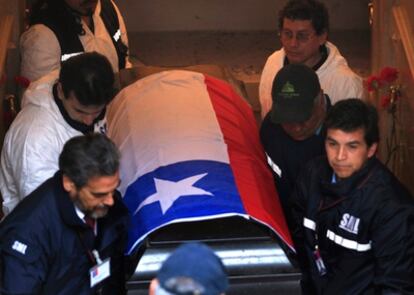Forensic experts seek definitive truth on Allende's presumed suicide
Judge wants to put to rest rumors Chilean leader was murdered during coup
Twelve medical examiners on Monday began analyzing the remains of the late Chilean President Salvador Allende, after he was exhumed from the family mausoleum in Santiago's Southern General Cemetery. Forensic scientists are trying to determine how many bullet wounds the body sustained.
The widely accepted account of the leader's death is that he committed suicide on the morning of September 11, 1973, when the presidential La Moneda palace came under attack by land and air during a bloody military coup led by General Augusto Pinochet.
But in 2008, doubts emerged when an expert report based on an original autopsy concluded that Allende's body may have two bullet wounds, raising the possibility that he was killed by the military. But that version seems unlikely, according to the testimonies of those who were with Allende until the last moment. They also reject that someone helped him commit suicide.
After the coup, Allende's body was initially taken to a cemetery in Viña del Mar and later, in 1990, he was buried in the family mausoleum. Neither the AK-47 assault rifle that he is said to have used to kill himself nor the bullet removed during the initial autopsy have ever been found.
The decision to carry out the exhumation was made by Judge Mario Carroza after ruling that there are a number of discrepancies in the various reports prepared by the military. The Allende case is part of a larger investigation by a prosecutor who last February filed 726 complaints relating to people who were killed or are still missing as a result of the coup, and whose whereabouts are still not known 38 years later.
International reaction to the coup in Chile and Allende's death was overwhelming in 1973. Millions of people around the world were shocked to see the images of the bombing of La Moneda and the subsequent arrests of thousands of people by the protagonists of the military coup, who hauled them off to the national stadium. Many were tortured and killed.
The bloody coup ended with the termination of Latin America's first democratically elected Marxist government, comprised of an alliance of leftist and center-left parties, including the communists. It had only lasted three years.
After his death, Cuban officials in Havana said that Allende was killed by an army captain who had ordered him to surrender but the president refused. Then came other accounts saying that the president had chosen to commit suicide to avoid being arrested.
In 1998, one of Allende's personal physicians, Óscar Soto Guzmán, who was in La Moneda on the day of the coup, published a book in Spain entitled The Last Day of Salvador Allende, in which he insists that Allende committed suicide. Soto said he saw him two minutes before he shot himself and another physician, Patrick Gijón, entered the room and found Salvador Allende sitting in a chair. "His skull was crushed," he said.
There is no official government version as to how Allende died. No party, including the coalition Concertación, which governed Chile from 1990-2010, or the Socialist Party, which Allende helped to found, has ever asked the courts to open an inquiry into the events.
For its part, Allende's family believes the president took his own life, as one of his daughters, Senator Isabel Allende, told the dozens of reporters and photographers who covered the exhumation on Monday. "Our belief is that President Allende decided to die in an act of political solidarity to defend the mandate given to him by the people," said the Socialist Party senator.

Tu suscripción se está usando en otro dispositivo
¿Quieres añadir otro usuario a tu suscripción?
Si continúas leyendo en este dispositivo, no se podrá leer en el otro.
FlechaTu suscripción se está usando en otro dispositivo y solo puedes acceder a EL PAÍS desde un dispositivo a la vez.
Si quieres compartir tu cuenta, cambia tu suscripción a la modalidad Premium, así podrás añadir otro usuario. Cada uno accederá con su propia cuenta de email, lo que os permitirá personalizar vuestra experiencia en EL PAÍS.
¿Tienes una suscripción de empresa? Accede aquí para contratar más cuentas.
En el caso de no saber quién está usando tu cuenta, te recomendamos cambiar tu contraseña aquí.
Si decides continuar compartiendo tu cuenta, este mensaje se mostrará en tu dispositivo y en el de la otra persona que está usando tu cuenta de forma indefinida, afectando a tu experiencia de lectura. Puedes consultar aquí los términos y condiciones de la suscripción digital.








































